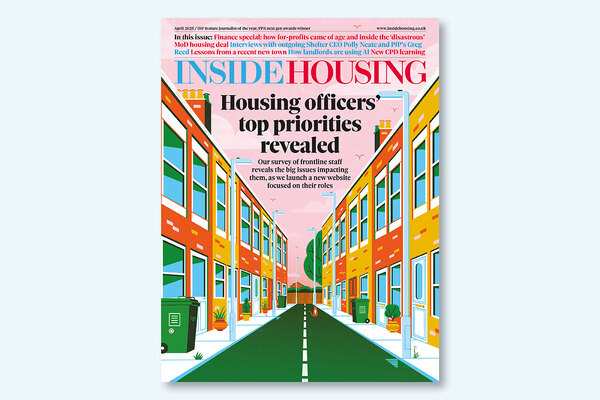
Charlie Proddow is head of social housing at Winckworth Sherwood
What will social housing providers need to address in 2024?
Charlie Proddow points to the five things social housing providers will need to consider in the year ahead
1. New regulatory frameworks
Many of the key provisions of the Social Housing (Regulation) Act 2023 will kick in this year. It is a landmark moment for the social housing sector. A much greater focus on tenant issues will now be proactively regulated by the Regulator for Social Housing.
For registered providers (RPs), this means significant changes to the way they operate, where they allocate funds, the range of data they need to collect and the way tenants are involved in decision-making structures. There is a lot for RPs to consider, and the early part of the year will be the last opportunity for them to prepare before they are subject to regulatory scrutiny from April 2024.
As well as the introduction of a proactive consumer regime and a new set of consumer standards, the government will release the results of their consultations on Awaab’s Law and the professional qualifications RPs’ employees will need to hold. RPs therefore need to be alive to whether further changes to their businesses will be needed.
2. More planning uncertainty
Housing delivery declined dramatically in 2023.
The Levelling-up and Regeneration Act 2023 was designed to provide much-needed clarity and efficiency to the planning system, but various amendments during the act’s passage through parliament have created unwelcome layers of complexity, bureaucracy and burden. Rising building safety standards and the introduction of new levies are slowing things down further.
The current Section 106 and Community Infrastructure Levy (CIL) regimes are by no means perfect, but RPs are used to them and understand how they impact viability considerations. The proposed Infrastructure Levy represents a significant shift away from this. Since the initial announcement in March, little detail as to how providers can prepare for this change has followed. We hope that will emerge this year.
Uncertainty relating to the general election is inevitably compounding the current state of paralysis within the housing sector. Ambiguity over housing targets and the delayed publication of changes to the National Planning Policy Framework cast doubt on the current government’s support for the industry.
In contrast, the Labour Party – currently enjoying a significant lead in the polls – has said it will recommit to targets and scrap plans for the Infrastructure Levy. With so much up in the air, providers can be forgiven for treading cautiously.
“Uncertainty relating to the general election is inevitably compounding the current state of paralysis within the housing sector”
3. The long shadow of building safety
As expected, huge swaths of secondary legislation was published in 2023. Its immediate and unexpected effect was to create more, not less, uncertainty, as RPs grappled with definitions, contradictions and a lack of practical guidance. We can expect more of the same.
This year, the standard-form construction suites, such as JCT, will publish amendments to deal with building safety to assist the industry in fair contractual risk allocation. We will also start to see Building Safety Regulator Gateway Two and Three determinations. These will assist in understanding how to frame and particularise such applications and how much delay applications cause construction programmes.
This will also be the year of building safety cases and certificates, as the regulator starts to call buildings in for assessment. We anticipate safety cases and certificates will start to become mandatory for insurance, sale and charging purposes during the year.
We also expect to see determinations on remediation orders, more case law on remediation contribution orders and, we predict, the first determination on the scope and extent of a building liability order.
The latter will have a profound effect on the industry, introducing a parent-company guarantee by default and thereby, we think, preventing or hampering the dissolution of special purpose vehicles whose lifespan would otherwise only have run to the end of making good defects or the last unit sale.
4. For-profit RPs, new investors and investor-RP joint ventures will increase
This year will see an increase in collaboration between for-profit and charitable RPs, particularly at the development stage. New investors and joint ventures will prove popular.
Alternative funding models will continue to make an impact while interest rates for traditional debt funding remains stubbornly high. Investors and stakeholders will increase activity through joint ventures, lease structures and management leases, taking equity stakes and entering into forward-sale agreements. Successful models are already emerging, such as M&G’s shared-ownership fund and its tie-up with Hyde and other RPs. Others will follow.
Investors not traditionally seen in the social housing market will show greater interest in this sector – and not just in shared ownership.
The economy is likely to continue to experience challenges in 2024, with a slow rate of growth, high costs of retrofitting alongside construction, and tenants’ consumer legislation. An injection of equity will provide a boost for the sector, provided it is carefully managed. In this environment, traditional RPs going it alone might struggle to pay their bills.
Strong governance to ensure both a big-picture understanding of the organisation and its competing priorities and obligations, together with comprehensive data to ensure specific details are available, will continue to be essential for all RPs. The regulator will continue to expect robust stress-testing from RPs, with real thought given to resolution recovery planning.
Practical mitigations include a focus on flexibility. A rolling charging programme, finance terms with as much flexibility as possible and a hedging policy should all put RPs in a strong liquidity position, so that appropriate debt can be issued at short notice when market conditions are favourable.
“We anticipate safety cases and certificates will start to become mandatory for insurance, sale and charging purposes throughout the year”
5. Social rents, homelessness… and a new government
The big question is whether there will be a change of government and with it a change in grant dynamics from home-purchase products to those supporting rented stock. Will a new government create a renewed focus on the outlawing of Section 21 notices and enhanced protection for those in the private rental market?
Whatever shape of government 2024 provides, there will be an increased focus on professionalism, as housing associations continue to address criticisms raised over the previous 12 months.
Charlie Proddow, partner and head of social housing, Winckworth Sherwood










